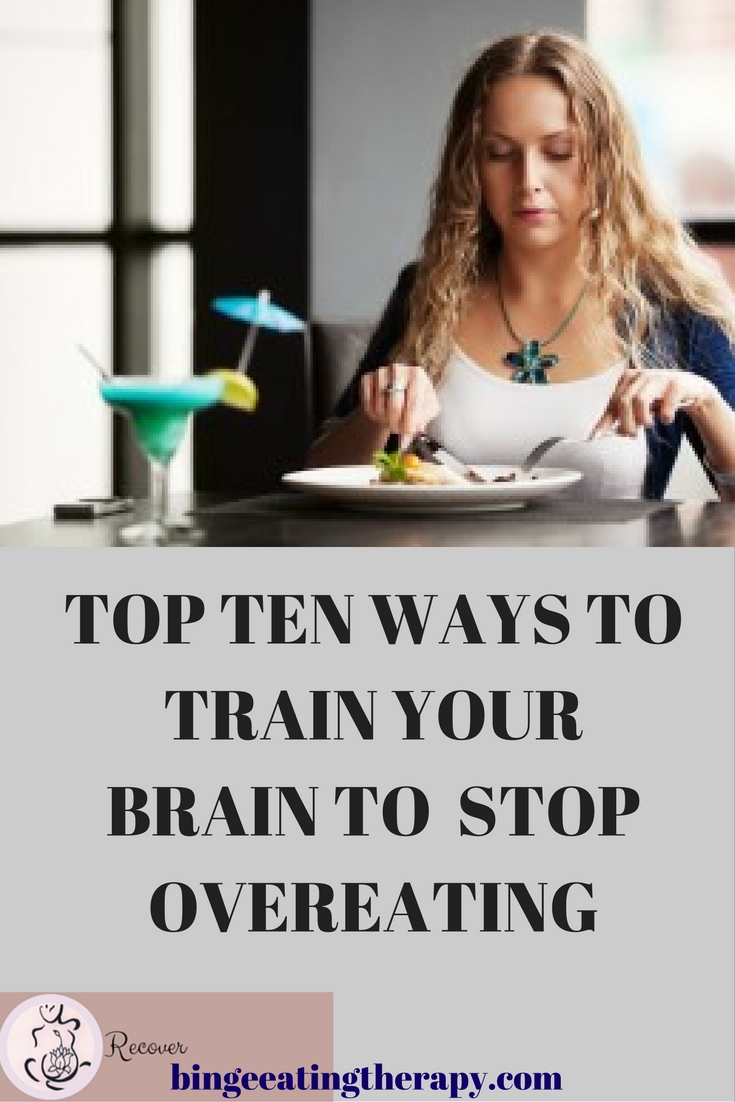10 Ways to Train your Brain to Stop Overeating

You know how sometimes it’s not even noon but you know that you are going to have a binge when you get home from work that night? You begin planning it, thinking about what stores you’re going to go to, what foods you’re going to get, where you are going to eat it, what you’re going to do when you eat it, what it will feel like in your mouth, what you will be doing while you’re bingeing (will you be watching television? will you be searching the web? will you be on the phone? or will you just be sitting alone with the food?) You begin to get excited and your amygdala (the part of your brain responsible for emotional reaction) lights up with excitement. Just the anticipation and desire of a binge creates activity in your brain that basically brings you to the binge. So your actual binge starts about hours, sometimes even days before the binge starts. It’s those first thoughts about it, the anticipation which just carries itself and basically makes you feel as though you don’t have a choice. The thoughts of bingeing carry you straight to your binge. But that’s not the only thing that the anticipation does. Just think about food and you flood dopamine into your nucleus accumbens (the pleasure center of the brain) which then excites you, calms you and motivates you to go for the food that you are thinking about. Just like the drug addict who starts to think about cocaine which then motivates them to score their drug of choice despite whatever dangers lurk. So, not only are you addicted to the binge, and those pleasurable feelings that come with it, but you are actually addicted to the process of bingeing, the thoughts about food, the plans that you make to get food, the thoughts about food. Each thought that you have has a biochemical reaction.
Which makes quitting binge eating as difficult (or more difficult) than quitting heroin or cocaine. When food is your drug of choice, you can’t just stop eating, you have to learn to stop overeating and stop abusing food.
SO HOW DO YOU DEAL WITH THE ADDICTION PIECE OF ALL THIS IN ORDER TO STOP OVEREATING?
When you first have those thoughts and the pleasure center in your brain begins to light up with anticipation (it’s not unlike the process of flirting, or hooking up with someone pre-sex or orgasm), it feels as though it’s over. You’re going to binge. However, when you check in with yourself and say, “oh yeah, there are those thoughts again, I’m planning my binge…” you can slow yourself down. You can tell yourself that just because you are planning your binge, doesn’t mean that you have to go through with it. Just because the process part of the addiction has begun does not mean that you have to go through with it. Remember, this is the SAME EXACT function that cocaine addicts go through before they score their drug, it’s the same process that sex addicts go through when they are looking for a prostitute, it’s the same process that gambling addicts go through when they are selling their wedding ring for money to put in a slot machine.
So what we want to do here is slow your brain waaaayyyy down. Even though it’s just noon and you are at work in front of your computer, your mind is at home in the refrigerator or in front of the television with a pizza.
So what can you do?
1. First, recognize “oh, I’m having THOSE thoughts again…” And say it out loud, “there is that urge to binge…”
2. Remind yourself, “I’m not in the middle of the binge yet, I’m right here at my desk.”
3. Ground yourself, look at your feet on the floor, look at your hands, put your hand over your heart and breath into your belly. Be where you are, not where your mind is taking you.
4. Remind yourself why you don’t want to be on the other side of the binge. Think to yourself, “I don’t want to be in bed tonight with my belly hurting, feeling bloated and uncomfortable, I don’t want to wake up tomorrow morning feeling bad.” Then let yourself feel those bad feelings of how you feel after a binge. Reliving them will be a deterrent for you.
5. Think about alternatives, think about what it would be like to wake up the next morning without a binge, let that process excite your mind. Imagine yourself eating a healthy dinner in a healthy way and see yourself in bed that night feeling comfortable and waking up the next morning with a spring in your step.
6. Plan something equally relaxing for that evening ie: date with friend, bubble bath, taking a long walk outside while listening to music or podcast
7. Call someone and tell them that you have a binge planned and you don’t want to go through with it.
8. Get on the forum and ask for support.
9. Remind yourself that you have a choice. It doesn’t feel like you do, but you do, the thoughts and the desire can’t make you binge, they are just thoughts and desire. You have thoughts and desires a million times a day that you don’t act on.
10. Calm your brain down and slow down your thinking with deep breathing and meditation.
Eating disorders are notoriously rough because they hit you on lots of different levels, process addiction, food/sugar addiction, trauma relief, bad habit… there are a million different reasons that people binge, but if you can bring some mindfulness into the equation, you have an amazing chance of not only being able to stop overeating over and over, but also from recovering and not having to deal with the urges and the pain of bingeing anymore.
Online Binge Eating Treatment - LEARN MORE!
EVIDENCE BASED INTERVENTIONS THAT REWIRE YOUR BRAIN TO:
-
STOP BINGE EATING
-
AUTOMATICALLY MAKE HEALTHY CHOICES
-
GAIN A FEELING OF PEACE AND CALMNESS IN YOUR BODY
-
RECOVER FROM BINGE EATING FOR GOOD



 Follow
Follow
